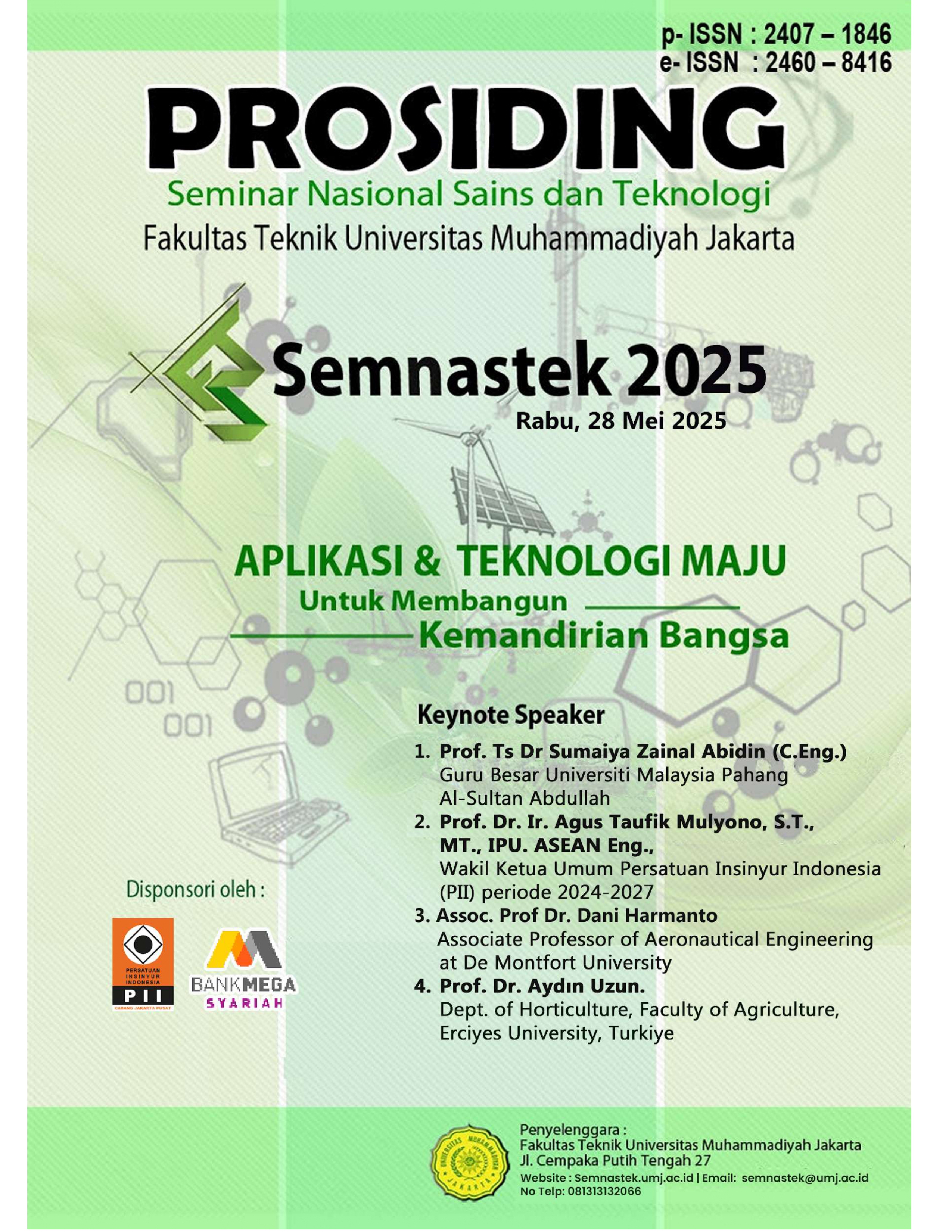Pemisah ION Kalsium Dan Megnesium Dengan ION Litium Dari Konsetrat Brine Water Gunung Panjang Dengan Sodium Sulfat
Keywords:
Proses Pengendapan, Sodium Sulfat, Lithium Ion, Brine WaterAbstract
Salah satu upaya untuk mendapatkan lithium dari brine water di Indonesia adalah memisahkan ion lithium dari pengotornya. Brine water dari Gunung Panjang memiliki potensi sumberdaya lithium di Indonesia, dengan kadar lithium 22,06 ppm. Pusat Riset Metalurgi – BRIN telah berhasil membuat konsentrat brine water dengan komposisi ion lithium 1.248 ppm, ion kalsium 22.710 ppm dan ion magnesium 14.892 ppm. Latar belakang penelitian adalah tingginya pengotor ion kalsium dan magnesium dari konsentrat brine water maka diperlukan pemilihan bahan pengendap yang tepat . Tujuan dari penelitian ini adalah untuk mengetahui efektivitas bahan pengendapan sodium sulfat dalam memisahkabn ion kalsium dan magnesium dengan ion lithium dari brine water Indonesia. Hasil percobaan menunjukkan perolehan lithium dalam filtrat cukup tinggi yaitu 95 %, namun proses presipitasi dengan sodium sulfat cukup rendah yaitu dibawah 50 %. Kemudian berdasarkan derajat pemisahan diperoleh menurunkan rasio Ca/Li dari 18,20 menjadi 6,26 dan Mg/Li turun 11,93 menjadi 9,21. Hasil terbaik diperoleh dengan penambahan sodium sulfat dengan konsentrasi 200 g/liter sebanyak 225 ml untuk setiap 400 ml konsentrat brine water.References
Eko Sulistiyono, Latifa H. Lalasari, Wahyu M and Agus B. Prasetyo. 2018. Study of lithium extraction from brine water, Bledug Kuwu, Indonesia, by the oxalic acid and carbonate sodium. AIP Conference Proceedings, 1964 (May 2018). https://doi.org/10.1063/1.5038289
Eko Sulistiyono, Sri Harjanto, and Latifa H. Lalasari.2022. Separation of Magnesium and Lithium from Brine Water and Bittern Using Sodium Silicate Precipitation Agent. Resources. 2022.11.89 https: // doi.org/ 10.3390/ resources 1110089.
Fariza Eka Yunita, Nadia C. Natasha, Eko Sulistiyono, Ahmad Risky Rhamdani, Hadinata A dan Erlina Yustanti. 2020. Time and Amplitude Effect on Nano Magnesium Oxide Synthesis from Bittern using Sonochemical Process. IOP Conf. Series: Materials Science and Engineering, 858 (2020) 012045 doi:10.1088/1757-899X/858/1/012045.
Gunther Martin, Lars Rentsch, Michael Höck, dan Martin Bertau. 2017. Lithium market research – global supply, future demand, and price development. Energy Storage Materials, 6 (August 2016), 171–179. https://doi.org/10.1016/ j.ensm. 2016. 11. 004.
Khuyen Thi Tran, Kyu Sung Han, Su Jin Kim, Myong Jun Kim, dan Tam Tran (2013). Recovery of magnesium from Uyuni salar brine as high-purity magnesium oxalate. Hydrometallurgy, 138, 93–99. https://doi.org/10.1016/j.hydromet.2013.05.013.
Latifa H. Lalasari, Widowati M.K, Nadia C. Natasha, Eko Sulistiyono, dan Agus B. Prasetyo. 2017. The Synthesis of Calcium salt from brine water by the partial evaporator and chemical precipitation. IOP. Conf.Series: Materials Science Engineering. 176. 2017.012040 doi: 10.1088/ 1757- 899X /176/1/012040.
Lihua He, Wenhua X, Yunfeng Song, Xuheng Liu dan Zhongwei Zhao.2017. Selective removal of magnesium from a lithium-concentrated anolyte by magnesium ammonium phosphate precipitation. Separation and Purification Technology. 187. 2017: 214-220.
Miftakhur Rohmah, Latifa Hanum Lalasari, Nadia C. N, Eko Sulistiyono, Florentinus F and Johny Wahyuadi Soedarsono.2020. Adsorption Behavior of Alkali Metal (Na+, Li+, and K+) from Bledug Kuwu brine by Resin Adsorbent for Purification: pH and Flow Rate Parameter. Oriental Journal Of Chemistry. ISSN: 0970-020 X, CODEN: OJCHEG, 2020, Vol. 36, No.(2): Pg. 273-279. DOI: http://dx.doi.org/10.13005/ ojc/360209
Nugroho Agung Pambudi. 2018. Geothermal power generation in Indonesia, a country within the ring of fire: Current status, future development, and policy. Renewable and Sustainable Energy Reviews, Volume 81, Part 2, January 2018, Pages:2893-2901.
Nugroho Agung Pambudi, Ryuichi Itoi , Rie Yamashiro, Boy Yoseph CSS Syah Alam, Loren Tusara, Saeid Jalilinasrabady , dan Jaelani Khasani 2015. Geothermics: The behavior of silica in geothermal brine from Dieng geothermal power plant, Indonesia. Geothermics, 54, 109–114. https:/ /doi.org/ 10.1016/j.geothermics. 2014. 2.003
Pratima Meshram, Pandey B.D, dan Mankhand T.R (2014). Extraction of lithium from primary and secondary sources by pre-treatment, leaching, and separation: A comprehensive review. Hydrometallurgy, 150, 192–208. Doi: https://doi.org/ 10.1016. Hydromet. 2014. 10.012 Review
Sarvesh S, Sabris, Vickram V. Banakar, Porag R. Gogate, A. Raha, and Saurabh, 2022. Reactive Crystallization of CaCl2 and Na2SO4 in the presence of acoustic cavitation. Chemical Engineering and Processing: Process Intensification. Volume 170. January 2022, 108702, doi: https://doi.org/10.1016/j.cep.2021.108702
Xianhui Li, Yinghui Mo, Weihua Qing, Senlin Shao, Chuyang Y. Tang, and Jianxin Li. 2019. Membrane-based technologies for lithium recovery from water lithium resources: A review. Journal of Membrane Science, 591 January, 117317. doi: https://doi.org/10.1016/ j. memsci. 2019.117317
Ye Zhang, Yuehua Hu, Li Wang, and Wei Sun 2019. Systematic review of lithium extraction from salt-lake brines via precipitation approaches. Minerals Engineering, 139 (July), 105868. https://doi.org/10.1016/j.mineng.2019.105868.

